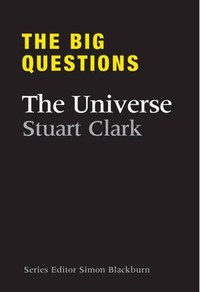|
|
Review: The Big Questions: The Universe
by Jeff Foust
Monday, August 9, 2010

The Big Questions: The Universe
by Stuart Clark
Quercus, 2010
hardcover, 208pp., illus.
ISBN 978-1-84916-238-8
£12.99
One thing can be said about astronomy and its related sciences: the questions they try to answer are literally as big as the universe they study. Some of the most fundamental questions of our existence fall into their realm: How was the universe created? How did our solar system form? Is there life out there beyond the Earth, intelligent or otherwise? And what is the ultimate fate of the universe? Those are among the questions that British astronomer Stuart Clark examines—but can’t always answer—in the aptly named book The Big Questions: The Universe.
| Clark packs a lot into 200 pages: everything from the search for extraterrestrial intelligence to “M-theory” physics, which could provide the basis for alternate universes. |
The book (part of a series called The Big Questions, with other books on topics from philosophy to physics) takes on one universe-related question per chapter, starting with some basic questions (how old is the universe?) and moving on to more complex topics in cosmology, astrobiology, and exotic physics. Some of the questions posed in the book have been settled, like the composition of stars and why planets stay in orbit. Others, though, remain unanswered, such as the composition of dark matter and dark energy, and whether life exists on Mars or elsewhere. Arguably one question in the book is unanswerable: is there cosmological evidence for God? That’s something that is arguably more theological than cosmological.
The Big Questions: The Universe has a very basic, no-nonsense design, with a plain black cover and a shape that makes it look more like a bound notebook (right down to the elastic strap to hold the cover in place). There are illustrations, all in grayscale, but no color imagery. Instead, Clark examines the topics, provides the historical background, and either explains the answer to that big question, or discusses why we don’t have an answer yet and what the prospects are for finding one. He packs a lot into 200 pages: everything from the search for extraterrestrial intelligence to “M-theory” physics, which could provide the basis for alternate universes. It might be a little too much for the causal reader who wants some simple answers, but big questions about the universe often have complex, yet compelling, explanations.
Jeff Foust (jeff@thespacereview.com) is the editor and publisher of The Space Review. He also operates the Spacetoday.net web site and the Space Politics and NewSpace Journal (formerly Personal Spaceflight) weblogs. Views and opinions expressed in this article are those of the author alone, and do not represent the official positions of any organization or company, including the Futron Corporation, the author’s employer.
|
|
